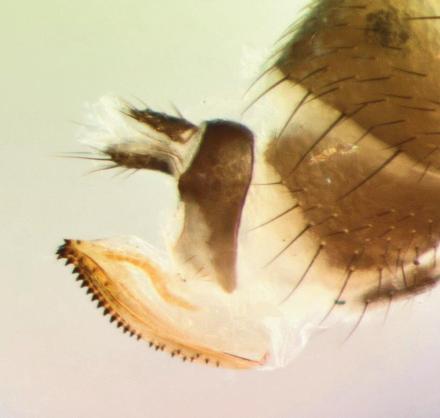News Headline March 17, 2010
Asian Fly Detected in Northwest Vineyards
Grapegrowers look out for spotted-wing drosophila, which attacks ripe winegrapes
by Peter Mitham

The spotted-wing drosophila's fearsome saw-toothed ovipositor is what makes it so damaging to grapes and other fruit.
Corvallis, Ore.--Northwest grapegrowers are preparing to fight new invasive pests threatening their vineyards. One of the least understood of these invaders is spotted-wing drosophila (D. suzukii), a species native to Asia that was initially reported in California in 2008.
Grapegrowers in Oregon’s Upper Willamette Valley discovered the insect in Pinot Noir grapes last year, and the fly was also detected in a non-commercial winegrape vineyard south of Abbotsford, British Columbia.
The discoveries on grapes and a variety of field berries and stone fruits have brought together researchers from California, Oregon and Washington state as well as federal and provincial scientists in British Columbia to tackle what could be a significant crop pest.
Unlike D. melanogaster and other, more familiar fruit flies that infest damaged and rotting fruit, D. suzukii attacks ripe fruit. Its hosts of choice are thin-skinned fruits which it attacks not opportunistically, through pre-existing lesions in the fruit, but with the assistance of a saw-like ovipositor that cuts through the skin of the fruit. It deposits its eggs, which frequently go undetected until the fruit collapses in on itself from rot.
Unfortunately, most of the research on the pest to date comes from Japan, leaving researchers scrambling to figure out how the fly may adapt to North America. The climate of the Pacific Northwest may limit it to just four generations per year by some counts, though it’s known to be a prolific parent in Japan with upwards of 13 generations per year.
Vaughn Walton, an entomologist with Oregon State University, said the pest is known to be in winegrape vineyards in Japan, but the cultivars are not ones widely planted in North America. Whether grapes are at significant risk is another question.
More facts needed
“We don’t have any real facts at this stage,” Walton said. “The current status is that we’re aware of it, but I don’t know of many growers that have had any real issues.”
Walton told Wines & Vines that one grower may have had grapes rejected on account of damage from the pest; that’s not been confirmed. There are also reports the fly may have successfully overwintered in some vineyards, but that also requires confirmation.
Still, researchers are not resting easy.
Surveillance is being ramped up across the Northwest this year, with Oregon State University set to launch tools that will track fly counts across the state on a weekly basis. B.C. Ministry of Agriculture and Lands staff will also be monitoring Fraser Valley vineyards to determine if D. suzukii poses a significant threat.
Walton said growers may face problems in years where grapes require extended hangtime. The ripe fruit will be a prime target for the flies, and the longer it’s on the vine, the greater the chance it will attract their attention.
On the other hand, cooler temperatures late in the season may inhibit the flies, which thrive at temperatures between 77º and 86ºF (25-30ºC).
“The flies may not develop that quickly, which in turn means that the berries may not spoil that quickly, either,” Walton said.
Fruit flies aren’t the only pests threatening Oregon’s $68 million grape crop
Researchers are also keeping an eye out for European grapevine moth, which already has some Napa Valley vineyards under quarantine. The fear is it may spread to Oregon vineyards.
The biggest focus of researchers are mealybugs, which are suspected to be playing a role in the spread of grapevine leafroll virus in southern and eastern Oregon.

415.453.9700 | Fax: 415.453.2517
info@winesandvines.com


